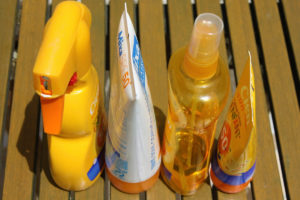 Summertime is here and now is the time for children to rejoice and shout for glee as most are finishing up their school year. Put away the pens and paper and lunchboxes and prepare to enjoy the warm, sunny days. No Mr. and Ms. Retailer, not YOU, the children. The moment the schools let out is the moment you should be preparing to roll out the merchandise for the next school year. Wait too long and you will be a step or two behind your competition.
Summertime is here and now is the time for children to rejoice and shout for glee as most are finishing up their school year. Put away the pens and paper and lunchboxes and prepare to enjoy the warm, sunny days. No Mr. and Ms. Retailer, not YOU, the children. The moment the schools let out is the moment you should be preparing to roll out the merchandise for the next school year. Wait too long and you will be a step or two behind your competition.
Certainly, most children will not be anxious to go school shopping so soon after starting their vacations but we, the dads and moms out here, are always looking for special sales and deals that will save us a few bucks. Education may be free but all of the accessories are not. Think about what we parents are purchasing to send the kids off to school. We are asked to provide crayons, pencils, pens, glue, and paper. Lunchboxes, backpacks (wait, regular or see-through?), binders and notecards also fill our school supply lists. From there schools and grades may have varying requirements. The retailer who is going to be top of the class is the one who will anticipate the needs of the pupils and parents and prepares accordingly.
What are some of those things that you can do to get the head start that will drive sales for your business?
- If you aren’t keeping old school supply lists filed away, start doing so. This will give you a good idea of what teachers will probably ask parents to provide the coming year. The schools will probably not make lists for the coming year available until July so knowing last year’s information gains you some advantage.
- Advertise. Use social media and in-store flyers as cost-effective means of getting the word out to customers. You may also want to check on the price of a radio spot to air a short commercial. If you only rely on posting flyers and banners in the store you are limiting your advertising to those customers already shopping with you. You need to spread the message to bring in additional shoppers.
- Create displays near the front of the store that focuses on school-related supplies that complement each other. For example, create an endcap with binders, loose-leaf paper, pencils, pens, crayons, compasses, and protractors. If your store is geared to clothing then displays for children’s clothing should be on focal points. Regardless of what your store specializes in, order a one-time shipment of some lunchboxes and food storage containers for sandwiches, chips, dressings/sauces. Parents are conscientious of rising school lunch prices and reusable containers appeal to both the cost concerned and environmentally focused families.
- In the process of creating the displays don’t forget about merchandise protection. Use electronic article surveillance labels and hard tags on everything. Don’t lose sight of the fact that those displays will also attract the attention of shoplifters and they will steal merchandise that isn’t secure. Small and expensive items will be especially tempting.
- Begin clearance pricing some summer products earlier to free up floor space for back to school related merchandise.
- An easy to overlook opportunity is to keep your check lanes full of impulse buy goods. Snacks and drinks are top items but finding cool gadgets and pens that may interest students and adults are great opportunities for a few extra dollars.
- Don’t forget about add-on sale items. Calculators tend to be popular and they need batteries. Peghook your calculators, keeping your high-end TI-83’s, TI-84’s, etc. in Alpha Keeper boxes to make them available to customers while protecting them from theft. Add the corresponding AA and AAA batteries on additional rows of peg hooks and deter theft by using Auto Peg Tags. Speaking of batteries it would also be a good idea to place battery chargers and rechargeable batteries in this type of display. Again, expense minded and green-minded patrons will find something to appeal to them here.
It is not always easy to think outside the box when anticipating the needs of school students especially if your store specializes in one area but it can be done. Be creative and it can pay dividends.
A final thought on back to school sales opportunities. Some retailers offer special deals to teachers (who present official credentials). Not only does this help your profit line it is a huge boon for teachers who often use their own money for classroom supplies. You can develop a new loyal customer base with such an offer. Make preparations early for the return to the classroom and you will demonstrate you have learned your lesson well.
 In many parts of the country, school will be out soon and the plans for a summer vacation will come sooner than expected. And even though an article in Money magazine states that 56% of Americans haven’t had a vacation in 12 months, the place that most Americans visit when they Do take a vacation is Florida.
In many parts of the country, school will be out soon and the plans for a summer vacation will come sooner than expected. And even though an article in Money magazine states that 56% of Americans haven’t had a vacation in 12 months, the place that most Americans visit when they Do take a vacation is Florida.  The IT world has a phrase “garbage in, garbage out”. The same concept applies to hiring new employees. If you do not put effort into selecting a new employee, then chances are you will be disappointed down the road.
The IT world has a phrase “garbage in, garbage out”. The same concept applies to hiring new employees. If you do not put effort into selecting a new employee, then chances are you will be disappointed down the road. March is known for coming in like a lion and going out like a lamb. April showers bring May flowers but what in the world does May bring? May ushers in the summer sales season! Spring is wrapping up and now is the time to be getting your store ready for all of the shoppers looking for the items that will make the long, warm days of June, July and August a memorable time. The big stores are rolling out grills, picnic wares and yard games.
March is known for coming in like a lion and going out like a lamb. April showers bring May flowers but what in the world does May bring? May ushers in the summer sales season! Spring is wrapping up and now is the time to be getting your store ready for all of the shoppers looking for the items that will make the long, warm days of June, July and August a memorable time. The big stores are rolling out grills, picnic wares and yard games. What do you do when a crisis occurs? Many people would say they take steps to address the crisis. Initially, that may sound like a good response unless you never planned on how you would react if that crisis were to take place. Think about it for a moment. If your business was on fire would you want firemen pulling up in their cars without the right gear or a plan of action of how they will take care of the fire? Sure it’s good to have the firemen there but if they don’t have the resources they need or a strategy on how to put out a house fire then the response is pointless. Police officers train on how to respond to a bank robbery in progress but the reality is many officers will never face that situation. According to a Cleveland Clinic Survey, 54% of Americans say they know CPR but the vast majority of us will never be called upon to use that training. So why do we do it? Why do we train for circumstances that are unlikely to ever confront us? We do it so we will be prepared for that one-in-a-million chance that we might have to apply that knowledge. President John F. Kennedy once said, “The time to repair the roof is when the sun is shining.” Attempting to play it by ear should an emergency happen is not a plan and may even make a problem worse.
What do you do when a crisis occurs? Many people would say they take steps to address the crisis. Initially, that may sound like a good response unless you never planned on how you would react if that crisis were to take place. Think about it for a moment. If your business was on fire would you want firemen pulling up in their cars without the right gear or a plan of action of how they will take care of the fire? Sure it’s good to have the firemen there but if they don’t have the resources they need or a strategy on how to put out a house fire then the response is pointless. Police officers train on how to respond to a bank robbery in progress but the reality is many officers will never face that situation. According to a Cleveland Clinic Survey, 54% of Americans say they know CPR but the vast majority of us will never be called upon to use that training. So why do we do it? Why do we train for circumstances that are unlikely to ever confront us? We do it so we will be prepared for that one-in-a-million chance that we might have to apply that knowledge. President John F. Kennedy once said, “The time to repair the roof is when the sun is shining.” Attempting to play it by ear should an emergency happen is not a plan and may even make a problem worse.
 Sometime this year you will most likely be conducting an inventory. Some stores even conduct multiple inventories when they have high stock shortage results. While it does not necessarily translate to poor results, a lack of adequate preparation can have an impact on the final shortage numbers.
Sometime this year you will most likely be conducting an inventory. Some stores even conduct multiple inventories when they have high stock shortage results. While it does not necessarily translate to poor results, a lack of adequate preparation can have an impact on the final shortage numbers. In a recent article published in LPM Insider, “Security Footage Sinks Employee Lawsuit Targeting Employee Bag Checks” by Garrett Seivold, Feb 7, 2018, they discussed a lawsuit brought against Nike by an employee who complained that he was being required to have package checks done when he was off the clock. His argument was that he was not being compensated for the time he is delayed. For the time being Nike has not been found to be excessive in its demands. They were able to demonstrate that employees were only being stopped for an average of 18 seconds for an inspection. This is hardly excessive by any measure. However, courts have a tendency to be inconsistent or a higher court may overturn a lower court decision. While one court may uphold the decision in favor of Nike there is no guarantee this will be true should a similar lawsuit be brought against other retailers.
In a recent article published in LPM Insider, “Security Footage Sinks Employee Lawsuit Targeting Employee Bag Checks” by Garrett Seivold, Feb 7, 2018, they discussed a lawsuit brought against Nike by an employee who complained that he was being required to have package checks done when he was off the clock. His argument was that he was not being compensated for the time he is delayed. For the time being Nike has not been found to be excessive in its demands. They were able to demonstrate that employees were only being stopped for an average of 18 seconds for an inspection. This is hardly excessive by any measure. However, courts have a tendency to be inconsistent or a higher court may overturn a lower court decision. While one court may uphold the decision in favor of Nike there is no guarantee this will be true should a similar lawsuit be brought against other retailers.  Many small and big chain businesses across the country are fed up with the amount they lose due to shoplifting and employee theft.
Many small and big chain businesses across the country are fed up with the amount they lose due to shoplifting and employee theft. Because like alcohol abuse, both legal and illegal drug use, affects your bottom line. This issue
Because like alcohol abuse, both legal and illegal drug use, affects your bottom line. This issue 